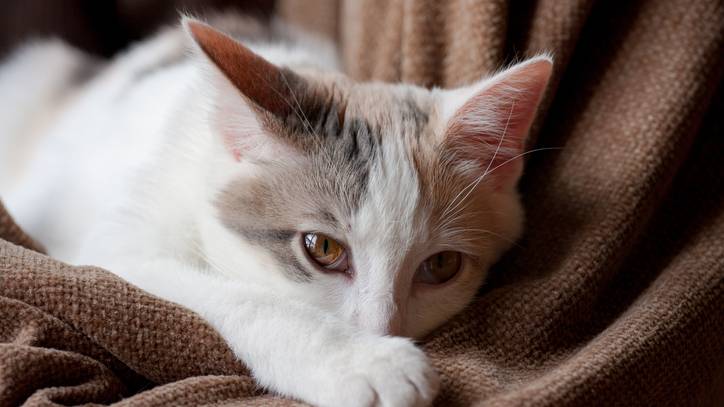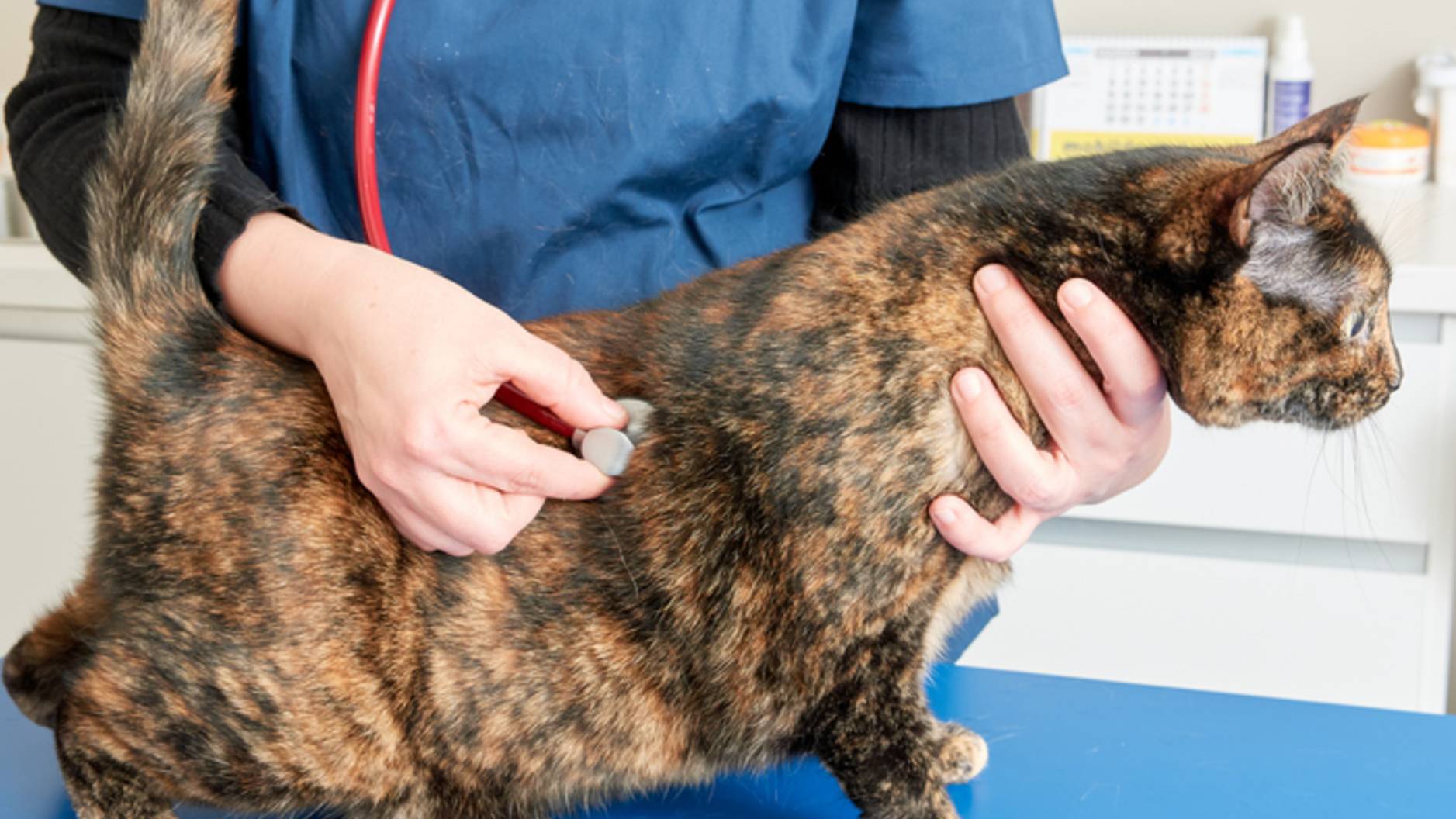Why is my cat losing weight? Common causes of weight loss in cats
Unless you have intentionally put your cat on a diet, a cat losing weight is a red flag

When you notice your cat losing weight, you may be tempted to dismiss the concern and wait it out. Resist this temptation! Unless you are intentionally restricting your cat’s calorie intake to promote weight loss, weight loss in a cat is not something that warrants a “wait and see” approach.
Some cases of feline weight loss can be easily explained and addressed, but many cases of unexplained weight loss in cats are caused by underlying disorders that require veterinary care.
This article will help you to assess whether your cat is sick and why and what you should do if you notice the tell-tale signs.
- Anxiety in cats: Causes and how to help a stressed feline
- How to treat a kitten with worms
- Hairballs in cats: A vet's guide to causes and treatment
Signs of weight loss in cats
Determining whether your cat is overweight, underweight, or at an ideal weight isn’t always as easy as it seems. Long hair can make it difficult to see your cat’s true body outline, making it difficult to notice subtle changes.
Additionally, many of us become so accustomed to seeing our cats every day that gradual changes can go unnoticed. Perhaps you go to pick up your cat one day and they unexpectedly feel lighter than you remember. Or maybe you realize that much of their food is being left uneaten. Regardless of what triggers your concern about weight loss, this concern should be taken seriously.
If you are unsure whether your cat is losing weight, it can be helpful to assess your cat’s body condition in an objective manner. First, look at your cat from above. Do you see a nice tuck or taper at the waist? If so, this suggests that your cat is not overweight. Next, run your hand along your cat’s ribs. Can you feel the ribs? If your cat is at a healthy weight, you should be able to feel the ribs but they will be covered in a thin layer of fat. If your cat’s ribs feel very prominent or if you are able to see them visibly, your cat is underweight. Assessing your cat’s body condition on a regular basis can make it easier to detect subtle changes.

Possible causes of weight loss in cats
Weight loss in cats can have a number of potential causes. In some cases, weight loss may be due to simply underfeeding your cat.
Get the best advice, tips and top tech for your beloved Pets
This type of weight loss can successfully be addressed by feeding an appropriate amount. Intestinal parasites can also contribute to weight loss in some cats, although this is most common in kittens and less common in adults. Cats with weight loss caused by parasites will often begin gaining weight after a deworming treatment.
Other common conditions associated with weight loss in adult cats include:
- Hyperthyroidism: In these cats, the production of excess thyroid hormone causes the metabolism to “speed up.” These cats are often ravenously hungry and eating more than usual, but they continue to lose weight despite their increased food intake.
- Diabetes mellitus: Cats with diabetes mellitus often do not respond appropriately to insulin, meaning they are unable to move sugar from their bloodstream into their cells. This prevents the cells from receiving nutrition, even though they are surrounded by sugar. Body tissues, including fat and muscle, break down and affected cats lose weight.
- Chronic kidney disease: When the kidneys are not functioning optimally, they may fail to filter the blood appropriately. The build-up of toxins in the blood can lead to decreased appetite and nausea, resulting in weight loss.
- Dental disease: Oral and dental issues are often painful. This makes affected cats reluctant to eat. If dental disease is not detected and treated early, it can lead to weight loss.
- Gastrointestinal disease: A variety of gastrointestinal conditions can lead to weight loss, by causing a decrease in appetite or interfering with the body’s ability to absorb nutrients.
All of these conditions are serious, with far-reaching effects beyond simple weight loss.

What to do if your cat is losing weight
If your cat appears to be losing weight, be sure that you are feeding your cat an adequate amount. Automatic feeders can run empty, or perhaps you have multiple cats and one of them is hogging all of the food. If your cat is otherwise healthy except for minor weight loss, it may be worth increasing your cat’s food for a few days to see if that helps address the problem.
A cat that is losing weight despite adequate access to food, however, should be seen by a veterinarian. The same is true for any cat that is losing weight suddenly and dramatically, or any cat in which weight loss is accompanied by other signs of illness.
Your veterinarian will begin by performing a thorough physical exam. They will listen to your cat’s heart and lungs, palpate (feel) the structures within your cat’s abdomen, assess your cat’s lymph nodes, ensure that your cat’s neurologic function is normal, and assign your cat a body condition score. Your veterinarian will also weigh your cat and compare your cat’s current weight to previous weights in the medical record, in order to quantify your cat’s weight loss.
Next, your veterinarian will recommend appropriate diagnostics to determine the cause of your cat’s weight loss. Initial diagnostics may include blood tests, urinalysis, and radiographs of your cat’s abdomen. Depending on the results obtained on initial screening tests, your veterinarian may recommend more specific testing. Diagnostic tests play an essential role in determining the cause of your cat’s weight loss and allowing your veterinarian to recommend appropriate treatment.

Treating weight loss in cats
The treatment of weight loss will depend upon the underlying condition. In most cases, a simple diet change or food increase will not be sufficient to make your cat gain weight. Your veterinarian will recommend appropriate treatments, based upon the underlying cause of your cat’s weight loss. Correcting the underlying condition that caused your cat’s weight loss is essential, because this will help your cat regain an appropriate amount of weight while preventing other complications.
In the case of a cat losing weight, it’s important to objectively quantify the weight loss and search for underlying conditions. While some cases of weight loss will have an easy explanation, such as underfeeding or intestinal parasites, most will require a full veterinary diagnostic workup. Your veterinarian will perform a physical examination, recommend appropriate diagnostic tests, then recommend treatment options for the condition that is causing your cat’s weight loss.
Want to learn how to tell if your kitten is overweight? Read our vet's guide.
Dr. Barnette is a graduate of the University of Florida, where she received both her B.S. in Zoology and her Doctor of Veterinary Medicine (DVM). She has 15 years of clinical experience as a small animal veterinarian, treating dogs, cats, and occasional exotic patients. She now works as a freelance veterinary writer, creating educational content for veterinarians, veterinary team members, and dedicated pet owners. Dr. Barnette lives in southwest Florida with her husband and daughter (plus two cats, a dog, and a rescued dove!) and enjoys kayaking, biking, and hiking. Learn more about Dr. Barnette at www.linkedin.com/in/catherinebarnette.

